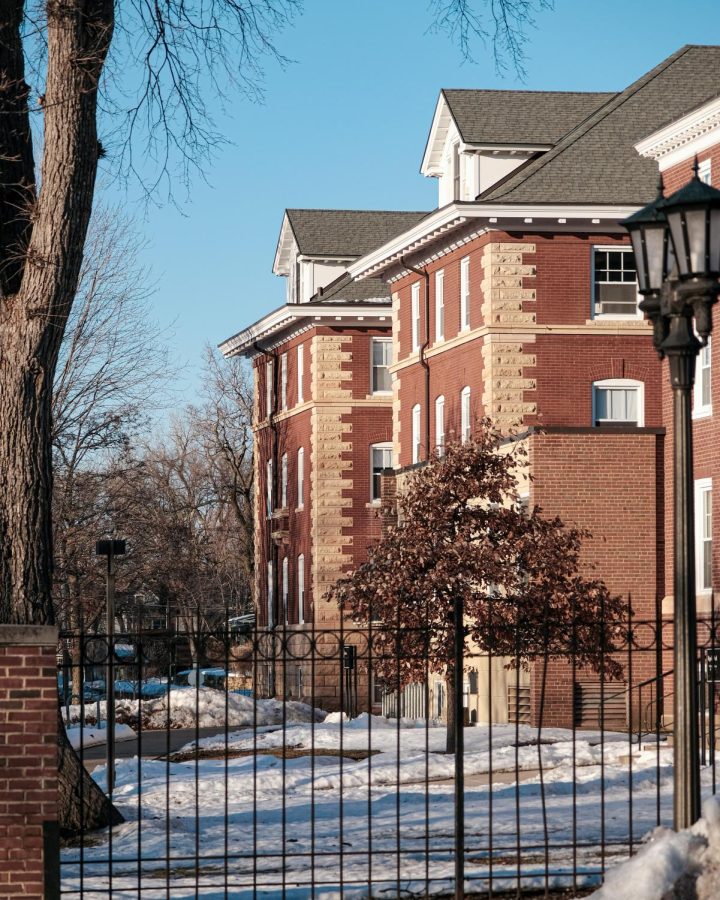Wallace 4 to become substance-free community in 2023-24 academic year
February 16, 2023
In a Mac Daily announcement on Monday, Feb. 6, Residence Hall Director (RHD) Alex Curtiss shared Residential Life’s plans to implement a residential substance-free affirming community for the 2023-24 academic year. This new specialty housing will be located on the fourth floor of Wallace Residence Hall and created with the intention of supporting students “who are either sober-curious or who identify as in recovery,” according to the Mac Daily announcement.
With this plan, the entirety of Wallace 4 will be designated as a substance-free space for this community, and 24 spots will be available to students. Residential Life’s quiet and courtesy hours policies will apply to the community: quiet hours will be in place after 10 p.m. on weekdays and after 1 a.m. on weekends.
In addition, community-building on the floor will be supplemented with programming aiming to support and empower residents who choose to live there. According to Executive Director of Residential Life Kyle Flowers, this programming has been developed in collaboration with Health Promotion and Sexual Respect of the Laurie Hamre Center for Health and Wellness.
Moving forward, Residential Life intends to continue to use Wallace 4 for this purpose.
Resident assistant (RA) Bobbie Pennington ’24 reflected on the planning that went into the upcoming housing opportunity, with his involvement in the planning process revolving around ways to promote the housing opportunity. He highlighted the conversations that he had with Curtiss, who is leading this project, throughout the fall semester. In particular, the two discussed how the location of 30Mac often made it difficult to uphold its residential protocol as a 24 hour quiet space.
“We started speaking about this last semester, mostly in terms of how 30Mac was not working,” Pennington said. “30Mac is a great concept on paper, but [being] sandwiched between two residence halls that are busy and noisy doesn’t make sense for a space like that.”
Flowers provided additional comment on these conversations, mentioning how 30Mac has served as both substance-free and 24 hour quiet housing, with no other residential spaces functioning as either type of housing separately; the plan for the substance-free community addresses part of this concern.
He also detailed the specific reasons behind Residential Life’s choice to designate Wallace 4 as the space for the community.
“Our department decided Wallace 4 would be more of an ideal setting to allow for less traffic and hold a particular section of the building that could cultivate a shared sense of community,” Flowers wrote in an email to The Mac Weekly.
Pennington expanded on the notion of community building, highlighting the importance of inclusion and acceptance for those who choose to live in the space.
“I think it’s normalizing being substance-free,” Pennington said. “Having that community … is going to make a big change in how people view themselves within the [Macalester] community. That feeling of being surrounded by parties and thinking ‘okay, I’m the odd one out’ is not cool. I’m sure that makes people feel isolated, so having a community will … make it more normalized and more accepting.”
Pennington also explained that the RA for the substance-free affirming community will be purposely selected.
“There’s going to be a specific RA chosen with intentionality,” Pennington said. “RAs generally [facilitate] the programming on their floor, so … [Residential Life] is not just choosing a random RA and saying ‘you’re going to have the substance-free floor.’ There are RAs who are interested in doing it and are wanting to partner with Alex to make programming around that … happen.”
However, Pennington did mention a couple of concerns surrounding the current plan for the substance-free community, including the fact that only rising sophomores, juniors and seniors are able to apply for this housing.
“[It’s important] to have a plan for first-years who want to come here and immediately live in substance-free housing,” Pennington said. “I know that’s hard. There’s a lot of anxiety with moving to college for anyone, and I can imagine for somebody who really needs to live in substance-free housing how their anxiety must skyrocket.”
While acknowledging that mixed-year floors of residence halls can be complicated and create additional work for RAs, Pennington hopes that Residential Life coordinates substance-free housing for first-years moving forward.
He also discussed how the lack of single rooms on Wallace 4 may give rise to challenges for those who wish to live in the community but do not want to share their space with a roommate.
Overall, Pennington is optimistic about the upcoming housing opportunity and believes it will be beneficial for the Macalester community.
“I think if you’re even curious if this housing situation would work for you, … [you should] talk to Alex [Curtiss],” Pennington said. “Alex is really knowledgeable about all of this and deeply cares about this, and … I think the more specialty housing we have, the better because we’re a diverse student body and we have different needs, and having places that fit your needs is great. And this is the first step in the right direction.”
Applications to live in the substance free-affirming community in the 2023-24 academic year are currently open, and interested students are encouraged to apply by Feb. 28.
Cal Martinez contributed to the reporting for this story














